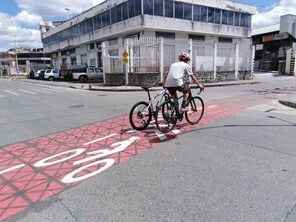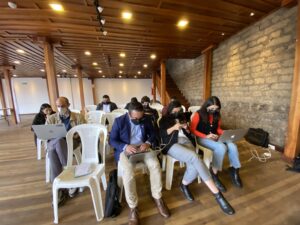By Leonie Gellweiler and Karla Hernández
The City of Cuenca has set their sights on becoming the leader on sustainable mobility in Ecuador. Over the past 3 years, the municipality has been working on expanding the urban cycling infrastructure to offer a sustainable solution that can fight traffic jams, the rising costs of fossil fuels and provide a healthy alternative to private vehicles. From deploying bike lanes, implementing a cycling-hire sharing scheme to promoting recreational activities, these actions are supporting Cuenca’s push forward to a sustainable transition which also includes an intermodally public transport system.
The city is taking many steps to move forward in sustainable mobility and has been working with TUMI as part of it’s COVID-Challenges and E-mobility pilot. Together, the Municipality, EMOV, the Public Mobility Company and TUMI where able to work on:
- Reviewing of existing designs, especially intersection designs, in Cuenca
- Assessing safety of current infrastructure
- Developing of a list of recommendations including new designs
Without a doubt, the city has ambitious plans but a high commitment towards sustainability: it has already constructed 8.5 km of bike lanes since 2020. However, there are still gaps and connecting infrastructure is missing.
- Bike lanes in Cuenca ©EMOV EP
- ©EMOV EP
How can TUMI DATA complement Cuenca’s transition to sustainable mobility?
As part of the city’s mobility management, the pilot under TUMI Data will build on the previous efforts by supporting the Bici Pública Cuenca, the city’s public bike sharing system. While pre-pandemic demand for transportation services has generally rebounded and increased, demand for bike sharing has not, despite the improvements to the city’s bicycle infrastructure. Thus, the city’s overarching goal is to increase user numbers and trips. The Data Pilot will contribute by providing the necessary data through quantitative and qualitative analysis and propose changes based on that data. More specifically, it aims to:
- Generate and/or use data on citizens’ perceptions and travel motivations in Cuenca to better understand the use of the city’s public bicycle system
- Analysis of current and pre-pandemic user information (routes, coverage)
- Conduct an analysis of existing system usage data (including an assessment of reasons why they have stopped using the public bicycle system)
- Develop data analysis with improved database and logging/ querying
- Provide recommendations for system operation
- Support for the integration of new components into the BiciCuenca platform
The first in-person workshop was held on August 4th in Cuenca. During the workshop, the initial activities were reviewed with a broad group of stakeholders and the further project procedure is currently being worked out.
- At the workshop on August 4th. ©CAF
- At the workshop on August 4th. ©CAF
Stay tuned to hear updates about the Cuenca Data Pilot soon! In the meantime, you can read more about the other two data-driven projects in Bogotá and Fortaleza.



